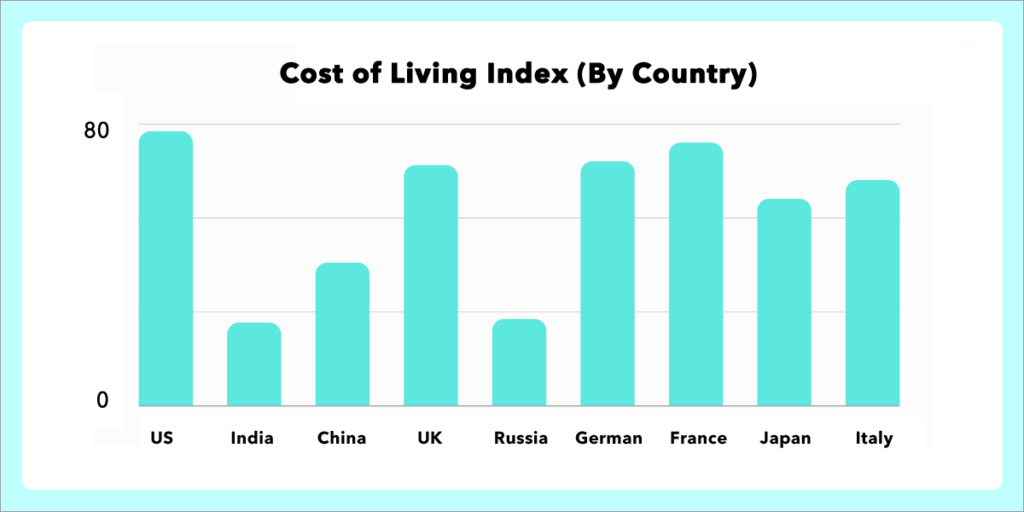In light of the global economic downturn and the challenges facing major economies, many companies are re-evaluating their business strategies. This shift is evident in the North American and Euro-UK markets, where companies are experiencing a decline in sales. Consequently, tech giants like Google, Meta, Microsoft, Salesforce, and Amazon have announced layoffs within their tech services departments.
Amid these changes, outsourcing to India has emerged as an increasingly viable option. Companies are now focusing on improving operations at their India-based hubs to boost profits. Experts estimate that 40% of the tech jobs lost globally could potentially be outsourced to India.
Notably, India’s major tech companies have expanded their headcount by 35% over the past year, outpacing the global increase of 12%. Currently, India accounts for 17% of the global tech workforce.
With technology companies such as Apple, Samsung, Boeing, Kia, Toshiba, and Siemens repatriating their production lines, India is poised to become a significant technology manufacturing outsourcing hub. Today, India is recognized not only as a cost-effective alternative for recruiting skilled resources but also as a hub for emerging technologies like AI, Blockchain, Cloud Computing, and ML.

Recent collaborations between India and the United States have further promoted technology sharing, development cooperation, and regulatory alignment between industry, government, and academic institutions. Key areas of cooperation include defense, clean energy, telecommunications, and cutting-edge technologies such as AI, quantum technology, cybersecurity, biotechnology, and space technology, showcasing India’s strength in the technology sector.
Indian IT outsourcing companies excel by offering unparalleled expertise, cost-effective solutions, and a commitment to innovation, setting the global standard in the tech industry.
Takeaways
- India is evolving into a hub for both IT outsourcing and technology manufacturing.
- Outsourcing software development to India offers a cost-effective solution for businesses facing budget constraints.
- India boasts a robust tech workforce and a conducive business environment.
- Businesses can find the right outsourcing partner in India through thorough research and analysis.
What Does IT Outsourcing Mean?
IT outsourcing involves hiring external companies to manage specific technology tasks that would traditionally be handled in-house. This approach allows businesses access to specialized skills, cost savings, and the ability to focus on core activities.
Outsourced services can range from software development and technical support to managing computer systems and other IT-related tasks. By collaborating with international partners, companies can tap into a pool of talent while simultaneously reducing expenses. While IT outsourcing can facilitate growth and adaptation, it also presents challenges in communication and security.
The concept of outsourcing began in the 1950s and 1960s, rooted in discussions about business diversification. Companies sought to maximize savings from economies of scale, determining which functions to retain internally and which to outsource for increased profitability.
Formalized as a business strategy in 1989, outsourcing gained traction as companies recognized its cost-saving potential. Pioneers like IBM and FDS started outsourcing software development 40 years ago, a practice they continue today. While many business strategies have come and gone, outsourcing has remained a mainstay.
Today, outsourcing is crucial for businesses of all sizes, aiming to access top-tier services without overspending. The 2020 pandemic further accelerated this trend, with more businesses turning to web development companies in India and other locations to maintain operations.
Even in 2023, outsourcing remains integral to digital transformation. It enables businesses to access highly skilled professionals in fields like blockchain, AI, RPA, chatbots, IoT, and ML, regardless of geographic or financial constraints. By outsourcing, companies can focus on their digital projects without the burden of managing the technological aspects in-house.
What Do Offshoring and Nearshoring Mean?
Outsourcing is a familiar term in the business world, often associated with offshoring and nearshoring. While these concepts are related, they are not identical. Understanding the distinctions between them is important for making informed decisions. Let’s delve into each of these concepts, building on our earlier discussion about what outsourcing entails.
Offshoring
Offshoring involves relocating specific business tasks or operations to another country. This differs from outsourcing, which refers to hiring an external company for certain tasks. Offshoring focuses on the geographical relocation of these tasks.
Why Should You Offshore?
One primary reason for offshoring is cost efficiency. Hiring workers in Western countries like the United States can be expensive. In contrast, countries like India have a skilled workforce available at lower costs. Thus, by offshoring to developing countries, companies can significantly reduce expenses while still accessing quality services.
Nearshoring
Nearshoring refers to outsourcing business tasks, such as IT operations, to a company in a neighboring country rather than within the same country. This strategy is influenced by geographical proximity, aiming to minimize cultural or traditional differences.
Why Should You Nearshore?
Companies often choose nearshoring to enjoy the benefits of outsourcing while avoiding challenges like time zone differences and cultural barriers. Nearshoring is perceived as a way to facilitate smoother communication and collaboration, eliminating some common outsourcing hurdles.
Which Is the Best Option?
The decision between offshoring, nearshoring, and outsourcing depends on various factors, including the size of your project, technological requirements, budget constraints, and other specific needs. If cost-efficiency and high-quality services are your priorities, outsourcing could be the most advantageous choice.
Outsourcing to India, in particular, offers a cost-effective solution compared to many other countries. India is renowned for its high-quality services, technical expertise, and exceptional skills. This approach provides flexibility and scalability, which may not be as readily available with offshoring or nearshoring options.
Outsourcing: Benefits and Drawbacks
Outsourcing, like any strategic decision, presents a mix of advantages and challenges. It’s crucial to weigh both aspects to make informed decisions. Here, we explore the various facets of outsourcing.
Benefits of Outsourcing
Outsourcing, particularly in software development, began as a strategy to reduce costs. Companies can economize by employing remote developers through third-party agencies instead of maintaining a full-time, in-house staff with higher salaries. Additionally, outsourcing opens up access to a global pool of top talent. Let’s delve into specific benefits:
- Outsourcing saves the company money
- You make your employees feel less stressed
- You can use a wide range of technology and get help from tech experts all over the world
- You can be focused on your work
- You can start selling your product more quickly
Furthermore, outsourcing enables employees to focus on strategic planning and other core business functions, without the added stress of overburdened work schedules. Companies can also leverage the latest technologies and expect high-quality outcomes due to the dedicated performance of outsourced teams.
Drawbacks of Outsourcing
Despite its benefits, outsourcing comes with its own set of challenges. Finding a reliable IT outsourcing partner, especially in countries like India, can be daunting. The remote nature of these relationships makes it difficult to assess an outsourcing company solely through virtual interactions. Let’s consider the potential downsides:
- You should spend time and work hard to find the best seller
- Your intellectual property could be in danger
- You might have trouble talking to teams that are far away
Additionally, entrusting tasks to an external party carries inherent risks, such as the potential misuse of intellectual property. Communication with teams across different time zones and cultures might also pose challenges. Effective planning and management are essential to mitigate these risks and ensure successful collaboration with overseas teams.
In-House: Benefits and Drawbacks
Following our discussion on the pros and cons of outsourcing, it’s equally important to consider the dynamics of in-house development. This approach involves utilizing your existing team or hiring new staff for a specific project. In-house development comes with its own set of benefits and limitations, which we’ll explore below.
Benefits of In-House
Many organizations believe that having a team physically present in one location fosters a more collaborative and productive environment. The proximity of team members facilitates easier idea exchange and communication. Here are some key advantages of in-house development:
- You have developers already working for your company who are a good match for your company’s culture
- You like talking in person with the team
- You can give and get feedback right away
In-house teams are already accustomed to your company’s policies and culture, making it easier to maintain a cohesive work environment. Additionally, the ease of in-person communication can sometimes outweigh the convenience of digital interactions.
Drawbacks of In-House
Despite its benefits, in-house development can present significant challenges, primarily related to costs and technical limitations. Here are some of the drawbacks:
- You have to spend more money to develop something
- You could have problems with technology
- You may see more developers leaving their jobs
Balancing the pros and cons of in-house development against those of outsourcing is crucial. Each business must consider how these factors align with its specific needs and objectives. This assessment will guide whether in-house development or outsourcing is the more suitable approach for a given project.
Signs That Indicate You to Outsource
Recognizing the right time to outsource is crucial for business efficiency and growth. There are several indicators that suggest when outsourcing might be a beneficial strategy for your company.
Lack of Resources
The inability to transform ideas into tangible products due to resource constraints is a significant sign. Innovation is key to keeping your business appealing to customers, whether it’s a startup or an established enterprise. If you find your business struggling to materialize new app ideas due to limited resources, outsourcing can provide the necessary support, especially for startups looking to bring fresh concepts to market.
Deadlines
Consistently missing deadlines is a red flag. If your business frequently struggles to complete tasks on time, leading to dissatisfaction among clients, it may be time to seek external help. Outsourcing some tasks to a software company can alleviate this pressure and ensure timely delivery.
Team Under Pressure
Observe your team’s workload and stress levels. If your team members are juggling multiple tasks and underperforming due to overburden, outsourcing can offer relief. Employing developers from countries like India can assist your team and address technological shortfalls.
Lack of Innovation
Innovation is essential for growth. If your team is not generating new ideas, it could be a sign of burnout or a creativity block. Outsourcing can introduce fresh perspectives and innovative approaches, invigorating your product development process.
Less Budget
Outsourcing originated as a cost-saving measure. If your company is facing budget constraints, outsourcing can be a viable solution. Contrary to the belief that it’s expensive, outsourcing, especially to countries like India, can be quite economical and effective in reducing overall costs.
Unhappy Clients
Addressing client satisfaction is a top priority for any organization. If you’ve noticed an increase in dissatisfied clients and challenges in meeting their needs, outsourcing could be a strategic solution. By delegating some of your business tasks to an external company, you can focus more on enhancing customer service and providing specialized software development solutions.
Which Country Is the Best for Outsourcing?
Given the benefits of outsourcing, such as expansion, cost savings, and access to the latest technology, the next crucial question is, “Which country is the best for outsourcing?”
A study by Korn Ferry forecasts a global shortage of skilled technology workers by 2030, potentially resulting in a $162 billion loss in industry earnings. In contrast, India is expected to have a surplus of 1 million highly skilled technology workers by 2030, positioning it as a leader in the tech industry.
According to Kearney’s 2019 Global Services Location Index, India ranks as the top destination for companies seeking outsourcing services. Over 500 Indian companies cater to the needs of Western businesses. Furthermore, some compelling statistics underscore the benefits of hiring Indian companies for outsourcing.
A Deloitte survey found that more than 59% of global businesses are outsourcing to Indian companies, and an additional 22% who are not yet doing so are considering it for the future.
Outsourcing Work to India – Statistics
The skilled workforce in India continues to attract global businesses. Here are some statistics highlighting India’s prominence in outsourcing:
- Language Proficiency: India has the world’s second-largest English-speaking population, with over 100 million speakers, minimizing language barriers.
- Educational Output: Annually, India produces over 3.1 million graduates, 300,000 post-graduates, and 500,000 engineering graduates.
- IT Workforce: The Indian IT industry employs approximately 4 million professionals directly and supports an additional 10 million jobs indirectly.
- Growing Talent Pool: Each year, India adds more than 200,000 new IT graduates to its workforce, contributing to one of the youngest workforces globally.
- Skill Development: It is projected that 40% of Indian IT workers will upskill in new technologies within the next four years.
- Developer Population: A report suggests that by 2023, India will surpass the United States in the number of software developers.
How to Find if Outsourcing to India is Right for You?
With a clear understanding of outsourcing, offshoring, and nearshoring, many businesses and entrepreneurs are contemplating whether to hire a company in India. It’s a significant decision, and we’re here to guide you through it.
Before proceeding, it’s crucial to weigh the decision of hiring external assistance against working with your existing team. A helpful starting point is to examine a comparative analysis of outsourcing versus in-house development. This involves not only understanding the differences between the two approaches but also considering their respective advantages and disadvantages.
| Factors | In-House | Outsourcing |
| Cost | High | Low in developing countries |
| Time to market | Takes time | Quick and Agile |
| Technological Expertise | Limited expertise | Vast pool of talent |
| Flexibility | Less flexible | Adaptive approach |
| Security | Secure | Chances of Theft |
| Communication | Clear and face to face | Difficult due to time zone difference |
| Cultural Differences | Follows corporate culture | May not follow corporate culture |
What Are the IT services That Are Outsourced to India?
India has become a global hub for outsourcing various IT services. Its appeal lies in the combination of skilled labor, cost-effectiveness, and technological prowess. Here’s a look at some of the IT services frequently outsourced to India:
Web Development
Outsourcing web development to India is popular among organizations worldwide. The decision to choose an Indian web development company often hinges on factors like quality, affordability, and access to advanced technology. Indian web developers are known for their expertise in creating cutting-edge websites that cater to diverse business needs.
Mobile App Development
For those with a mobile app concept, outsourcing the development to India can be an effective strategy. Whether you require a cross-platform or native application, Indian developers offer comprehensive services to meet all your app development needs. This approach not only leverages India’s technological capabilities but also ensures that your app is developed with the necessary features and functionality for success.
Business Solutions
Outsourcing business solutions can significantly enhance your company’s digital transition. This encompasses a range of services, from upgrading applications and migrating data to new systems, to consulting and system integration. Outsourcing also offers ongoing maintenance and support, streamlining and accelerating your digital transformation process.
Product Development
Outsourcing product development is a strategy that can benefit businesses of all sizes. It enables you to access a prototype or initial version of your project, ensuring alignment with your vision before final production begins.
Digital Marketing
Merely having an online presence is insufficient for brands today. Effective digital marketing is crucial for enhancing visibility, establishing a robust online presence, and increasing sales. As a result, many businesses are now outsourcing their digital marketing and SEO tasks to optimize time and financial resources.
Digital Transformation
An increasing number of businesses are collaborating with external partners for digital transformation initiatives. These partnerships are essential for companies looking to modernize their technological infrastructure, experiment with new technologies, or launch innovative digital products. Ideal outsourcing partners should possess expertise in low-code platforms, emerging technologies, and other essential digital tools.
12 Reasons Why You Should Outsource Your IT Services to India
India has emerged as a premier destination for outsourcing IT services, ranging from software development to technology manufacturing. Preferred over many Western European and Asian counterparts, India offers multiple advantages for outsourcing.
One of the key reasons is the adherence to GDPR and other regulations by Indian companies, ensuring safe and secure outsourcing practices. If you’re contemplating outsourcing to India, here are the top 12 reasons that make it an ideal choice:
Largest Source of Professional Talent
India’s vast pool of technology talent is a primary attractor for IT outsourcing. Statista reports a global developer population of 27.7 million, with 5.4 million based in India. Holding the largest share (19%) of software engineers globally, India has overtaken the United States, which has 4.4 million software developers.
India adds approximately 1.5 million software developers to its workforce annually. With 2,500 engineering colleges, 1,400 polytechnics, and 200 planning and architecture colleges, India’s educational infrastructure is geared towards nurturing tech talent.

According to Korn Ferry’s Global Talent Crunch study, India is uniquely positioned as the only country without a talent gap in the technology, media, and telecommunications sector. This makes India a reliable and strategic choice for outsourcing IT services.
Cost-Effective and Flexible Pricing
Profitability continues to be a major advantage of outsourcing to India, even after three decades. According to the latest data from Glassdoor, the annual salary for a full-time software engineer in the US is around $96,000. In contrast, hiring a full-time developer in India costs approximately $9,751 per year, which is nearly a tenth of the cost. The lower cost of living in India, compared to the US and other developed nations, contributes to this significant difference.

Based on Numbeo’s data, overall prices (including rent) in India are 317.1% lower than in the US. Thus, outsourcing to India can lead to substantial savings, up to three times less than what you would spend in the US, whether for hiring a single developer or establishing an entire office infrastructure. Furthermore, outsourcing to India offers various engagement models to suit different needs.
Options include partnering with outsourcing firms, hiring offshore developers, employing freelancers, or remotely building your internal team. You also have the flexibility to choose between fixed-cost, monthly, or hourly billing, depending on your project requirements.
High-Quality Services
India’s workforce is renowned for its talent and high-quality service delivery. Indian software professionals utilize advanced technology, software, and systems to stay competitive. Indian outsourcing companies adhere to international standards, such as:
- The Capability Maturity Model (CMM), which assesses an organization’s project completion capabilities by measuring process maturity.
- The International Organization for Standardization (ISO) practices Total Quality Management (TQM) to ensure high-quality design, development, manufacturing, and installation.
- Six Sigma quality methodologies.
- The Customer Operations Performance Center (COPC) standards for timely delivery of high-quality software.
India boasts the highest number of CMM Level 5 certified outsourcing companies worldwide, over 75%. Additionally, the Indian IT industry is a leader in AI skills, with one of the world’s largest AI/ML and Big Data Analytics (BDA) talent pools, and ranks third globally in the number of cloud professionals. The expertise of Indian software companies in advanced technology ensures precise and superior services, making outsourcing to India a strategic choice.
Advantage of Time-Zone
For US-based businesses seeking round-the-clock IT operations, outsourcing to India is particularly beneficial. The time difference between New York and India is approximately 9 hours and 30 minutes. When your internal team in the US concludes their workday, the team in India begins theirs.
This time-zone difference ensures continuous 24/7 support for ongoing operations, allowing businesses to maximize productivity during their standard working hours. This level of operational continuity and support is challenging to achieve with locally performed work.
Cultural Compatibility
Since the early 1990s, India has emerged as a prominent destination for back-office outsourcing, initially serving global airlines with logistics work before expanding into the IT sector. Pioneering companies like American Express, British Airways, and GE were among the first to outsource projects to India.
Over three decades as an IT outsourcing hub, India has significantly adapted to international work cultures, making cultural compatibility one of its key advantages. Indian technology firms have effectively embraced Western business models and cultural practices. They prioritize understanding the work environment and train their teams accordingly, fostering adaptability to Western cultures. Additionally, Indian programmers are known for their empathetic qualities and strong communication skills, often going beyond standard working hours to support projects.
According to a Nasscom study, over half of the Fortune 500 companies choose India for their outsourcing needs. India is the preferred outsourcing destination for 80% of European and US companies, prized for its ability to provide highly skilled professionals who adhere to ethical practices.
Transparency in Communication
Outsourcing to India ensures comprehensive transparency in all outsourcing activities. Initiatives begin with a Service Level Agreement (SLA), which sets clear guidelines on response times, communication protocols, and performance expectations, ensuring accountability. Indian software outsourcing companies often employ Agile and Six Sigma methodologies for transparent communication and active stakeholder engagement during project development.
These companies utilize advanced reporting systems to monitor project progress and communicate any challenges or delays to clients, ensuring complete transparency. The use of effective communication channels and project management tools further facilitates collaboration and streamlined documentation.
Favorable Government IT Policies
The Indian government has implemented various initiatives to promote the growth of the IT and ITeS sectors, aiming to position the Indian IT industry as a leader in technological innovation. Key measures include:
- Budget Allocation: The Union Budget 2023-24 allocated INR 97,579.05 crore ($11.8 billion) to the IT and telecom sector.
- STP Program: This 100% export-oriented program focuses on developing and exporting IT software, including professional services.
- International Cyber Security Collaboration: The Indian Computer Emergency Response Team collaborated with Singapore’s Cyber Security Agency in the “Synergy” exercise in August 2022, involving 13 countries and focusing on resilience against ransomware attacks.
- STPI Centers: Approval of 22 new Software Technology Parks of India (STPI) centers across the country.
- National Software Product Policy-2019: Aims to establish India as a global hub for software products through innovation, IP sustainability, commercialization, and support for tech startups.
- Next Generation Incubation Scheme (NGIS): This scheme is designed to create a dynamic software product ecosystem, supporting the IT sector in driving growth, creating jobs, and enhancing competitiveness.
State-of-the-Art Infrastructure
India’s rapidly growing economy is bolstered by its advanced infrastructure, which incorporates cutting-edge technologies across various sectors. With a GDP ranking fifth globally at $3.7 trillion, India’s government has made strategic investments in IT outsourcing. The country currently hosts 63 Software Technology Parks of India (STPIs) and 1,500 Global Competency Centers (GCCs).
Indian cities are equipped with the latest devices, software, and 5G high-speed Internet, ensuring seamless customer support and communication. Furthermore, India’s favorable Foreign Direct Investment (FDI) and import-export policies have earned it a 10th-place ranking in the Economist Intelligence Unit Business Environment Rankings (EIU BER) survey for ease of doing business.
Fastest Time to Market
Outsourcing IT services to India can significantly expedite your product’s time to market. The Indian time zone aligns well with North America and Europe, facilitating around-the-clock development and thus reducing project timelines.
The availability of a diverse and affordable technology talent pool allows for scalable operations, resulting in faster development cycles. As a hub for technology with a robust IT sector and startup ecosystem, outsourcing in India provides access to the latest tools and methodologies, accelerating market growth and commercialization.
English Proficiency
Effective communication is crucial for successful outsourcing, and a common language is essential for smooth interactions. India has the world’s second-largest English-speaking population, with English being the primary language of instruction in its education system, particularly in STEM fields. Consequently, Indian developers generally possess a stronger command of English than their counterparts in China or the Philippines. Additionally, India’s modern IT infrastructure, including 5G connectivity, ensures a seamless outsourcing experience for global businesses.
Focus on Core Business Skills
For businesses aiming to grow, it’s vital to focus on expanding the customer base, exploring new products, and sustaining current growth rates. Managing everything internally can divert attention from core business operations.
Outsourcing to India enables the delegation of non-core activities while maintaining efficient management of business functions, allowing your business to flourish in a competitive environment. As one of the largest outsourcing destinations, India offers a wide range of service providers for various business processes, making it easier to find a suitable outsourcing partner.
Scalability
Scalability is a key attribute of the Indian IT outsourcing sector, playing a vital role in its success and global appeal. The Indian IT industry has consistently demonstrated its ability to expand operations efficiently to meet the evolving demands of international clients.
A primary factor enabling scalability is India’s substantial pool of skilled IT professionals. This abundance of talent allows outsourcing companies to effortlessly adjust resources to handle increased workloads while maintaining high service quality. Time zone differences also contribute significantly to scalability, as they facilitate round-the-clock productivity, ensuring uninterrupted project advancement.
Indian outsourcing companies are noted for their adaptability to diverse project requirements. They exhibit proficiency in scaling teams, integrating new technologies, and managing complex, large-scale projects, showcasing an impressive capacity to align with client needs. This scalable nature not only boosts efficiency but also solidifies Indian IT outsourcing as a reliable option for businesses seeking flexible and responsive solutions.
How to Find the Best Indian Outsourcing Company?
Identifying the optimal Indian outsourcing company is crucial for your project’s success. While there are numerous firms offering IT services, selecting the right software partner is essential. The choice you make significantly impacts the effectiveness and longevity of your outsourcing endeavor.
To find the most suitable company, a practical approach is to ask pertinent questions. These inquiries should cover various aspects of their services, experience, and process. Here are key questions to consider:
- Can you explain to me your web development process?
- What does custom software development mean for you? Will it be specially made by you or will it be based on a premade template?
- What is the tentative date of completion of the project?
- How much does your experience relate to my industry?
- How much do you want us to be a part of the development process?
Asking these questions can help you identify an IT outsourcing company that aligns with your business objectives and possesses relevant industry experience. It’s important to conduct interviews with potential remote teams as thoroughly as you would for in-house candidates, ensuring the success of your outsourcing strategy.
Also Read: How Much Does it Cost to Make an App in 2024: Understanding Cost Factors
Choosing an Indian Outsourcing Company
Choosing a suitable IT outsourcing company in India involves a methodical approach to ensure that you partner with a firm that aligns with your project’s needs and goals. Here’s a guide to help you find the ideal outsourcing partner for your IT services in India:
Project Requirements
The first step is to clearly define the requirements of your project. This includes outlining the necessary technology, team size, developer expertise, product features, delivery timeline, and budget. Determine if your project requires a short-term or long-term commitment. A clear understanding of your project’s scope and objectives will help you identify the right outsourcing partner.
Research
Begin by researching companies that align with your project requirements. Look for firms with a strong track record, positive client feedback, and a portfolio showcasing diverse, successful projects. Utilize your business network, seek advice from industry peers, or explore industry forums for recommendations and insights. This step is crucial for shortlisting potential outsourcing partners.
Expertise and Experience
Assess the qualifications and expertise of the companies on your shortlist. Focus on their experience in your industry or specific field. Prioritize firms with a proven history of handling projects similar to yours, as this indicates a deeper understanding of your unique requirements and potential challenges.
Certification
Investigate the quality standards and certifications of the companies. Certifications like ISO and CMMI, or other relevant industry-specific credentials, are indicators of a firm’s commitment to quality and adherence to international standards. These certifications are a testament to their professional competence and best practices in coding and project management.
Communication Skills
Effective communication is crucial for successful collaboration with an outsourcing company. Seek a firm that has strong English proficiency, offers a dedicated project manager, and maintains transparent reporting channels. These aspects are vital for ensuring smooth, effective collaboration and project management.
Infrastructure and Technological Capacity
When outsourcing your project, assessing the technological capabilities of the company is crucial. Ensure they possess the necessary hardware, software, and security protocols to fulfill your project’s requirements.
Evaluate their use of project management tools and communication systems to guarantee efficient and seamless communication. Additionally, inquire about their ability to incorporate emerging technologies and tools that are relevant to your project.
Customer Referrals
Gathering referrals and researching previous project case studies is vital when selecting a software outsourcing company. Reach out to their past clients to understand their experiences, which can provide valuable insights into the company’s reliability and timeliness. Reviewing case studies or success stories also offers a perspective on the company’s problem-solving skills and project management effectiveness.
Security Measures
In the current digital landscape, data security and intellectual property protection are paramount. Verify that the outsourcing company adheres to legal and regulatory standards to prevent data breaches.
Examine their policies on data protection and intellectual property. Assess their security infrastructure and information security measures. It’s also important to review their contracts, non-disclosure agreements, and service level agreements to ensure comprehensive protection of your interests.
Financial Stability
Assess the company’s financial stability through its financial statements and market tenure. These indicators can provide insights into the company’s growth trajectory since its inception. Consistent growth is a positive sign of business stability and its ability to contribute effectively to your project.
Offshore Visit
Consider scheduling a visit to the outsourcing company’s site and arrange face-to-face meetings. This approach allows you to gain a deeper understanding of their work environment, team dynamics, and operational methodologies, helping you determine their compatibility with your organization’s culture.
Contract and Support
After selecting an outsourcing partner, it’s important to draft a comprehensive contract covering key project aspects, including expectations, deadlines, payment terms, and dispute resolution methods. Ensure the contract includes provisions for maintenance and support services, which are crucial for addressing any post-delivery issues that may arise.
Also Read: Mobile App Development Guide- Top to Bottom Analysis: How to Create, Fund and Earn from Your App
How Much Does It Cost to Outsource to India?
Understanding the appeal of outsourcing to India and the keys to successful collaboration, it’s essential to consider the costs involved. When hiring remote developers or teams from India, the expenses extend beyond salaries. There are additional and sometimes hidden costs that contribute to the total cost of outsourcing. Key factors influencing the cost include:
- Hiring cost
- Communication tools
- Software licenses
- Transitioning cost
- Updation and integration of IT systems with remote teams
- Outsourcing contracts
- IP rights and trademarks
- SSL certificate, travel, etc
For instance, consider the cost of having a remote team in India develop a Minimum Viable Product (MVP). This team might include a junior developer, a senior developer, a designer, a QA engineer, and a project manager. Completing this project could take approximately 320 hours or four sprints. A detailed cost breakdown would be essential to understand the full financial commitment.
| Variable | Cost for 320 hours |
| Cost per member | $1000 |
| Overall Salary | $37100 |
| Total Cost | $38100 |
Myths About Outsourcing to India
Outsourcing to India, a significant industry due to the vast number of IT professionals and remote developers, is surrounded by certain misconceptions. Here are some common myths and the realities behind them:
Language Issues
While language barriers are a common concern, India boasts over 300 million English speakers, a figure projected to rise significantly. This indicates that language is generally not a barrier when outsourcing to India.
Different Time Zones
Concerns about time differences affecting communication and project management are valid. However, professional offshore companies often accommodate client schedules. Furthermore, the agile development model allows for flexible scheduling of meetings and calls, mitigating time zone challenges.
Project Management
A lot of companies that hire Indian companies to make their software worry about not being able to control the project because the teams are far away. Outsourcing development to India can be a big challenge, but you can overcome it by clearly stating how much control you want in the service contract.
Unskilled Workers
A common concern among companies outsourcing to India is the skill level of the workers. However, this shouldn’t be a significant issue as most outsourcing firms allow you to select developers after evaluating their skills. If the output doesn’t meet your expectations, you typically have the option to request revisions or changes.
Intellectual Property Theft
While China is currently a major source of pirated software and products, concerns about intellectual property safety in Asia are also prevalent. To address this, most Indian outsourcing companies enter into contracts that include non-compete and confidentiality clauses. These agreements are designed to protect your intellectual property and ensure the security of your ideas and inventions.
Wrapping Up
In the context of the economic slowdown, outsourcing IT services to India offers numerous benefits due to the country’s technological expertise, large talent pool, and supportive government policies. India’s proficiency in emerging technologies, combined with its modern infrastructure, positions it as a prime choice for global businesses. The advantages include cost-effectiveness, a focus on quality, and a skilled workforce.
Additional benefits like time zone differences, English proficiency, and cultural compatibility enhance communication and collaboration. Indian IT companies are known for their innovative, flexible, and scalable solutions. Their commitment to security and successful global partnerships further cement India’s status as a top outsourcing destination.
FAQs
How can businesses lower risks when they hire Indian companies for IT services?
Businesses can lower risks by carefully selecting the right outsourcing partner, ensuring clear and effective communication, setting realistic expectations, regularly monitoring progress, and having contingency plans in place.
Is it really worth hiring Indian IT companies?
Yes, outsourcing to Indian companies offers access to skilled software developers, robust infrastructure, favorable government policies, cost-effective resources, and a work culture that aligns with international standards.
How does the time gap help the outsourcing companies in India?
The significant time difference allows for continuous work cycles, ensuring project momentum and efficiency. Indian teams can work during off-hours of other countries, accelerating project completion.
Are security measures good when hiring IT services from India?
Yes, Indian IT companies place a high priority on security, employing stringent measures like encryption, access control, and adherence to international security standards to safeguard sensitive information.





